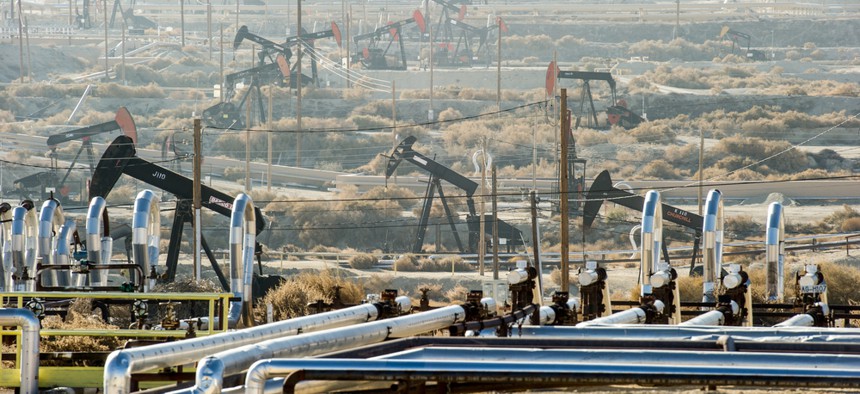
Christopher Halloran / Shutterstock.com file photo
Obama Administration Unveils Controversial Fracking Standards
GOP senators waste no time introducing bill to block the rules.
The Obama administration on Friday released highly anticipated federal regulations on fracking, the controversial drilling technique at the heart of America's energy boom.
The rules are intended as a safeguard against water contamination near drill sites where chemicals are injected into shale rock to unleash oil and natural gas. They arrive as part of a broader unilateral push by the administration to shore up Obama's environmental legacy while the White House touts the benefits of fracking and fossil fuels.
The standards, crafted by the Interior Department, are sure to face pushback from all sides. Environmental groups say the regulations fall short of what is needed to stave off environmental damage from fracking. The oil and gas industry, meanwhile, views the rule as the latest example of administration action to hinder America's energy boom.
Republican senators wasted no time fighting back. A slate of senators, including Senate Majority Leader Mitch McConnell and Environment and Public Works Committee Chairman Sen. Jim Inhofe introduced a bill Thursday evening that would block the rule, stating instead that states have the sole authority to regulate fracking on federal lands.
Interior Secretary Sally Jewell responded to the GOP attack during a call with reporters on Friday, saying that she expects "that these rules will in fact stick." "We believe that these standards are essential and that it is our charge to oversee them," Jewell said, adding, "We're confident right now that we're doing the right thing for the American people."
The administration won't just be fighting a fracking battle on Capitol Hill. The Independent Petroleum Association of America and Western Energy Alliance, two trade groups for the oil and gas industry, announced Friday afternoon that they had filed a lawsuit against the regulation. The legal challenge was filed in a Wyoming federal district court. It charges that the "administrative record lacks the factual, scientific, or engineering evidence necessary to sustain the agency's action."
Under the regulations, companies will be required to disclose chemicals used for fracking. New standards will take effect for well integrity, aimed at heading off leaks that could compromise the quality of ground and drinking water. The oil and gas industry will also need to draw up plans to safely manage the discharge of water from drill sites.
Ultimately, however, the reach of the rule will be limited. The standards apply only to fracking on public lands, which accounts for just a small portion of drilling activity. America's energy boom has largely taken place on state and private lands out of reach of the administration.
A series of peer-reviewed scientific studies have linked fracking to groundwater contamination. The Environmental Protection Agency's own analysis of the impact of fracking on drinking water is expected to be released as a draft later this year.
Republicans in Congress have vowed to take steps to roll back what they say is the Obama administration's regulatory overreach. Much of the GOP's ire has so far focused on landmark regulations to curb carbon pollution from power plants and a slate of other environmental regulations targeting smog and other pollutants. Regulations aimed at fracking, however, will provide fresh fodder for Republican attack.
Sen. Inhofe slammed the rule on Friday, saying that it "adds unnecessary, duplicative red tape that will in turn make it more costly and arduous for our nation to pursue energy security." Inhofe added that regulation should be left to the states, which is what the legislation he introduced on Thursday proposes to do. "There is no logical reason to add a new layer of top-down bureaucratic regulation that duplicates what is already being done effectively by the states," he said in a statement.
The rule has been years in the making, and its winding path to completion and multiple delays underscore the political difficulty the Obama administration faces as it promotes the domestic energy boom while trying to reduce its environmental harms.
Then-Interior Secretary Ken Salazar first announced that his agency would craft a plan to require disclosure of fracking chemicals in late 2010, but a draft regulation did not surface until mid-2012. However, Interior pulled back the draft plan in early 2013 and floated a second version in May of that year.
By unlocking fossil-fuel reserves trapped in shale rock, fracking has sparked the current windfall in domestic oil and natural gas production. As a result, the United States has surpassed Russia as the largest producer of both oil and natural gas.
Obama credits fracking with spurring the U.S. economy and curbing the nation's reliance on foreign oil, suggesting that natural gas can act as a "bridge fuel" to keep turbines turning while the nation's share of electricity from renewables steadily grows.
At the same time, however, the administration has pulled a series of levers to tighten safety and environmental standards for the drilling technique. Additional regulations to limit the release of methane, a potent greenhouse gas, from drill sites are expected to be unveiled before the president leaves office.
This story is breaking and will be updated.
Ben Geman and Jason Plautz contributed to this article.
(Image via Christopher Halloran / Shutterstock.com)
NEXT STORY: On the Use of Memes in Government Communication







